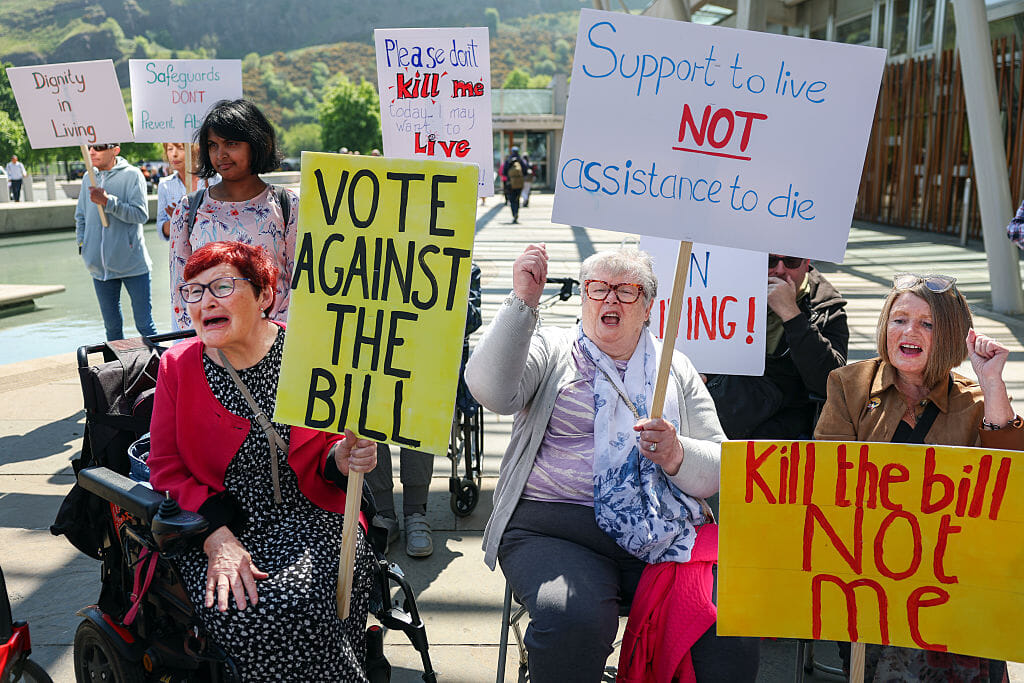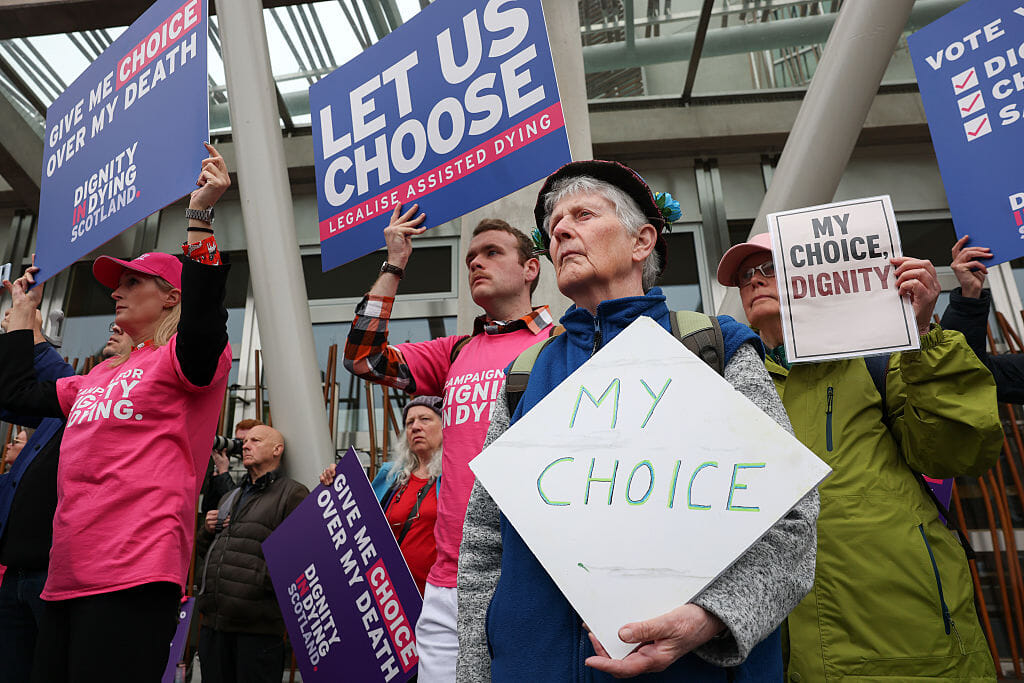Key Points
-
 MSPs have voted in favour of legalising assisted dying legislation
MSPs have voted in favour of legalising assisted dying legislation -
 Vote follows hours of, at times, emotional debate in Holyrood
Vote follows hours of, at times, emotional debate in Holyrood -
 The legislation would give terminally ill patients the option of requesting help to end their own life.
The legislation would give terminally ill patients the option of requesting help to end their own life. -
 It was passed with 70 votes to 56 with one abstention.
It was passed with 70 votes to 56 with one abstention. -
 The Bill will still have to come back to Holyrood after the amendment stage to pass a final vote before it can become law
The Bill will still have to come back to Holyrood after the amendment stage to pass a final vote before it can become law
The Scottish Parliament has voted in favour of taking a landmark first step toward legalising assisted dying.
After hours of debate on Tuesday, MSPs finally cast their votes in favour of the first stage of the bill’s journey to becoming law at around 7pm.
The legislation was passed with 70 votes to 56 with one abstention.
It would give terminally ill patients the option of requesting help to end their own life.
On one side, assisted dying advocates say people should have the freedom to choose a dignified death.
On the other, opponents say the bill is too concerning for individuals vulnerable to coercion and doesn’t have enough safeguards.
 Getty Images
Getty ImagesMany big names voted against the bill, including First Minister John Swinney, former first ministers Nicola Sturgeon and Humza Yousaf, Scottish Labour leader Anas Sarwar and deputy first minister Kate Forbes.
However, it still managed to gather enough support to take one step closer to becoming law.
What is the criteria?
Assisted Dying Bill
-
 Two doctors will need to independently certify someone is both terminally ill and has the mental capacity to request an assisted death
Two doctors will need to independently certify someone is both terminally ill and has the mental capacity to request an assisted death -
 Only those who have lived in Scotland for at least 12 months will be eligible
Only those who have lived in Scotland for at least 12 months will be eligible -
 They must be registered with a GP in Scotland
They must be registered with a GP in Scotland -
 There must be at least two weeks between a request being made and the necessary medication being provided
There must be at least two weeks between a request being made and the necessary medication being provided -
 The patient must have the capacity to take the life-ending medication themselves
The patient must have the capacity to take the life-ending medication themselves
Proposed by Scottish Lib Dem MSP Liam McArthur, the bill is the third attempt made by MSPs to change the law, and McArthur has already vowed to raise the age of assisted dying to 18 at the next stage of debate.
McArthur’s bill is now the furthest assisted dying legislation has ever gotten in Scotland, but it still has two more stages of amendment, scrutiny, and debate to go before MSPs will have a final vote for or against the legislation.
‘This is a landmark moment for Scotland’
Calling it a “landmark moment for Scotland”, McArthur has welcomed victory for his Assisted Dying bill at stage one.
“I understand that for many colleagues this has been a difficult decision but I believe the quality of debate today has shown our Parliament at its finest,” McArthur said.
“Over the coming months, I will continue to have discussions with my parliamentary colleagues, medical bodies and legal experts to ensure that this bill is robustly safeguarded so that terminally ill adults can have the choice of accessing assisted dying, alongside other palliative care and support at the end of life.
Labour MSP Pam Duncan-Glancy ‘heartbroken’
Labour MSP Pam Duncan-Glancy, who staunchly opposed the bill and gave an impassioned speech in the chamber on Tuesday said she was “heartbroken” after the vote.
“I genuinely hoped colleagues would see the risks associated with the Bill and understand the message it could send across Scotland to disabled people and others who are worried about what the Bill contains,” she said.
However, Duncan-Glancy said she heard “considerable trepidation” from some of her colleagues about the Bill on Tuesday, and she believes the bill could still be overturned at the final vote.
“Many colleagues said they’ll need to see significant amendments at stage 2 for the Bill to retain their support going forward,” she said.
“I believe as they try to do this, they will see there are no amendments that will safeguard against the concerns we heard in the chamber today.”
First Minister: ‘I live by the decisions of Parliament’
First Minister John Swinney came out against the bill earlier this week over concerns it would “alter the relationship” between patients and doctors in a “irrevocable and detrimental fashion”.
Following the landmark vote on Tuesday, Swinney said he did not support the bill, but would nonetheless “live by the decisions of Parliament”.
“Obviously Parliament has come to a conclusion at stage 1 of the proceedings. I didn’t support that position, but obviously parliament now has got a further stage of scrutiny to go through as it considers the legislation,” Swinney said.
“I didn’t agree with the bill. It’s not my position. I don’t think it’s the right path for us to take, but Parliament decided and I’m a democrat.”
‘My father could have died with dignity’
Joanne Easton, whose father died a “horrific” death in June 2021, was left speechless when the news was announced to campaigners outside of Holyrood on Tuesday.
“There’s clearly a lot more work to be done, but I hope we’ve taken the first step to taking care of our dying people,” the pro-assisted dying campaigner said.
Ms Easton’s father, Robert, was a former firefight who died of pancreatic cancer in June 2021 after considering taking his own life.
Since then, she has been backing the push to legalise the practice for people who have been diagnosed with terminal illnesses.
“[If assisted dying had been legal], my father would have went a long time before his body gave up,” Ms Easton said.
“He would have went with dignity and he would have went under his own steam. It would have been a peaceful death and his family wouldn’t be left with the trauma we’ve been left with.”
‘A huge win for choice and compassion’
Reaction from campaign groups has been swift.
On one side, the Humanist Society Scotland welcomed the outcome as a “huge win for choice and compassion”.
On the other side, the CEO of Care Not Killing, which led opposition to the Bill said McArthur has a “lot of convincing to do” before the Bill goes any further.
“There is massive opposition to the Bill and our campaign will now be stepped up as we prepare for what lies ahead,” Dr Gordon Macdonald said.
“Palliative care is broken and the NHS on its knees and needs fixing and proper funding – assisted suicide is seen as the cheap alternative by bureaucrats to proper funding for health and palliative care.
“Both sides of the debate agree that palliative care needs to be improved in Scotland, let us work together to achieve that moving forward. And in defeat, this Bill and the debate has highlighted that much more work needs to be done on palliative care in Scotland.”
Follow STV News on WhatsApp
Scan the QR code on your mobile device for all the latest news from around the country





























